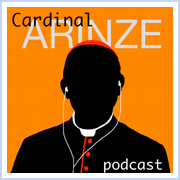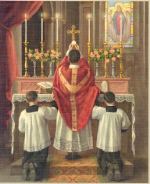Gospel for Saturday, 17th Week in Ordinary Time
From: Matthew 14:1-12
The Death of John the Baptist
[1] At that time Herod the tetrarch heard about the fame of Jesus; [2] and he said to his servants, "This is John the Baptist, he has been raised from the dead; that is why these powers are at work in him." [3] For Herod had seized John and bound him and put him in prison, for the sake of Herodias, his brother Philip's wife; [4] because John said to him, "It is not lawful for you to have her." [5] And though he wanted to put him to death, he feared the people, because they held him to be a prophet. [6] But when Herod's birthday came, the daughter of Herodias danced before the company, and pleased Herod, [7] so that he promised with an oath to give her whatever she might ask. [8] Prompted by her mother, she said, "Give me the head of John the Baptist here on a platter." [9] And the king was sorry; but because of his oaths and his guests he commanded it to be given; [10] he sent and had John beheaded in the prison, [11] and his head was brought on a platter and given to the girl, and she brought it to her mother. [12] And his disciples came and took the body and buried it; and they went and told Jesus.
*************
Commentary:
1. Herod the tetrarch, Herod Antipas (see the note on Mt 2:1), is the same Herod as appears later in the account of the Passion (cf. Lk 23:7ff). A son of Herod the Great, Antipas governed Galilee and Perea in the name of the Roman emperor; according to Flavius Josephus, the Jewish historian ("Jewish Antiquities", XVIII, 5, 4), he was married to a daughter of an Arabian king, but in spite of this he lived in concubinage with Herodias, his brother's wife. St. John the Baptist, and Jesus himself, often criticized the tetrarch's immoral life, which was in conflict with the sexual morality laid down in the Law (Lev 18:16;20:21) and was a cause of scandal.
3-12. Towards the end of the first century Flavius Josephus wrote of these same events. He gives additional information--specifying that it was in the fortress of Makeronte that John was imprisoned (this fortress was on the eastern bank of the Dead Sea, and was the scene of the banquet in question) and that Herodias' daughter was called Salome.
9. St Augustine comments: "Amid the excesses and sensuality of the guests, oaths are rashly made, which then are unjustly kept" ("Sermon 10").
It is a sin against the second commandment of God's Law to make an oath to do something unjust; any such oath has no binding force. In fact, if one keeps it--as Herod did--one commits an additional sin. The Catechism also teaches that one offends against this precept if one swears something untrue, or swears needlessly (cf. "St Pius V Catechism", III, 3, 24). Cf. note on Mt 5:33-37.
**************
Source: "The Navarre Bible: Text and Commentaries". Biblical text taken from the Revised Standard Version and New Vulgate. Commentaries made by members of the Faculty of Theology of the University of Navarre, Spain. Published by Four Courts Press, Kill Lane, Blackrock, Co. Dublin, Ireland.
Reprinted with permission from Four Courts Press and Scepter
Publishers, the U.S. publisher.









